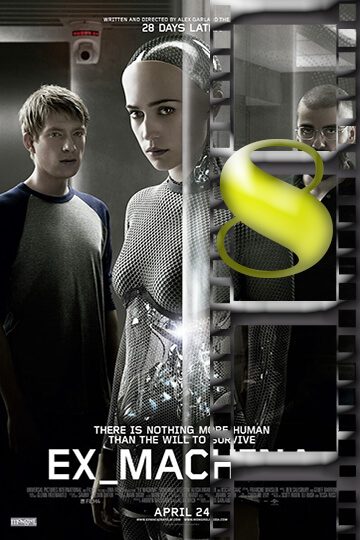



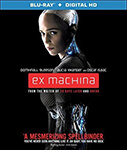
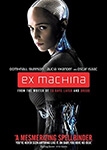
WHAT’S IT ABOUT
Caleb Smith (Domhnall Gleeson) a programmer at a huge Internet company, wins a contest that enables him to spend a week at the private estate of Nathan Bateman (Oscar Isaac), his firm’s brilliant CEO. When he arrives, Caleb learns that he has been chosen to be the human component in a Turing test to determine the capabilities and consciousness of Ava (Alicia Vikander), a beautiful robot. However, it soon becomes evident that Ava is far more self-aware and deceptive than either man imagined.
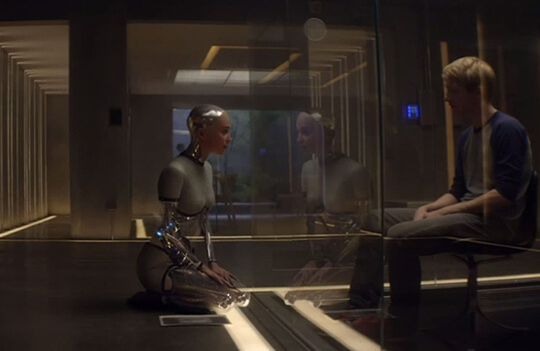

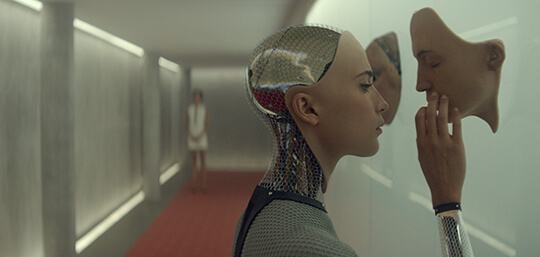
MOVIESinMO REVIEW
Alex Garland’s debut film, “Ex Machina” (2014), begins with this fairly familiar sci-fi concept: creating AI that might be smarter than us. But then it becomes this smartly executed psychological thriller that goes much further than you’d anticipate from a standard genre film, exploring some intense themes such as power, gender, race, and what it means to be human. The film follows Caleb (Domhnall Gleeson), a young computer programmer who has won a contest to spend a week at the isolated mountain retreat of his company’s reclusive CEO, Nathan (Oscar Isaac). Caleb discovers that upon arrival, he has been selected to help in a world-changing experiment with Ava (Alicia Vikander), an advanced AI housed in a stunningly realized robotic body. What begins as a sequence of Turing tests evolves into an elaborate dance of manipulation, in which the lines between examiner and examined, captor and captive, dissolve with increasing discomfort. As a Black spectator of this movie, it is impossible not to note the coded racial dynamics at play. Nathan, as portrayed by Isaac with his muscle-bound body and brooding intensity, is the tech bro stereotype with a disturbing god complex. His home is also a laboratory where he creates female-presenting AI beings who serve as servants to his own needs and wants. His only friend in the human world is Kyoko (Sonoya Mizuno), a shy Japanese woman who’s basically his maid, chef, and girlfriend. The movie lets us understand that she’s unable to speak English, which Nathan considers great because, as he casually tells Caleb, he’s “tired of talking.” This dynamic – a dominant white male encircling himself with exotic, subservient “others” – recalls uneasy histories of colonization and exploitation. The framing of Asian femininity as silent servitude is especially egregious, even as the film ultimately upends these dynamics. That Garland incorporates these elements without commenting on their racial aspects explicitly indicates either a blind spot or a conscious decision to allow these uneasy parallels to simmer in the background. The visuals in “Ex Machina” are just amazing. You’ve got this over-techie, sterile vibe inside Nathan’s lab, and then outside, it’s all this wild, lush nature, which totally amps up the tension between the creator and what he creates. The cinematographer, Rob Hardy, uses smooth, deliberate camera moves and really well-framed shots that kind of make you feel that whole watchful and trapped vibe. The way the light plays across Ava’s mesh body – revealing both her mechanical insides and human-like outsides – is a perfect visual metaphor for the movie’s exploration of what’s underneath our performed identities. Vikander’s Ava is particularly worthy of praise. She handles the delicate task of portraying a creature who is both learning to be human and perhaps surpassing humanity. Her movements are both mechanical in their exactness and growing in their grace, and her face conveys a consciousness that seems to expand with each interaction. The instant she first dresses herself completely as a human has a dissonant emotional quality – it is an instant of freedom, but also discomfort. Isaac, on the other hand, instills a terrifying charm into Nathan. His performance is a balancing act between greatness and savagery, between easy affability and deliberate manipulation. His dance number – a sudden image of sheer, surreal exhilaration – is one of the film’s most striking moments, an exhibition of the explosive unpredictability that lurks within Nathan. The soundscapes of the film deserve special commendation. Composers Geoff Barrow and Ben Salisbury have created a score that pulses with electronic tension, increasing the building tension without ever overpowering it. The sound design is also top-notch, and the subtle mechanical whirrs of Ava’s movements remind the audience of her otherness. What sets “Ex Machina” apart from a lot of other sci-fi films is how it digs deep into broader themes of control and power. You can definitely see it as a feminist story about women fighting back against man’s oppression, but it’s more of a discussion of how power systems tend to recycle themselves and how oppressed groups might end up having to use the same methods as their oppressors in order to get out. I mean, from a Black critical perspective, it’s really powerful when you consider a narrative in which something created solely to serve must deceive and outwit its creator in order to be free. And the conclusion – I won’t spoil it – really ties everything up in a manner that’s incredibly fulfilling but also somewhat unnerving, challenging us to confront our own biases and emotions. My few complaints are with the movie’s handling of race and with the limitedness of its examination of consciousness. The treatment of Kyoko remains problematic even as the character evolves, and the movie might have benefited from more of an acknowledgment of the racial underpinnings of its power dynamics. And though the philosophical issues brought up concerning consciousness are intriguing, they sometimes feel as if they have been oversimplified for dramatic purposes. “Ex Machina” is one of the rare sci-fi films that lingers in the mind well after it’s viewed, with one still pondering its ideas and implications. With its relatively low budget, it creates an intimate yet large universe that handles a small group of characters while bringing up questions of universal significance. In a genre that’s usually all about spectacle, Garland shows admirable restraint, building tension through dialogue and subtle shifts in power rather than big, explosive set pieces. The end result is a movie that simultaneously feels timeless and urgently contemporary as we struggle with issues of artificial intelligence, surveillance, and the power relationships built into our technologies.
OUR RATING – AN UNSETTLING 8
MEDIA
- Genre – Science Fiction
- Street date
- Digital – April 10, 2015
- Blu-Ray/DVD – July 14, 2015
- Video – 1080p
- Screen size – 2.35:1
- Sound – English: DTS:X, English: DTS-HD Master Audio 7.1, English: DTS 5.1, English: DTS Headphone:X
- Subtitles – English SDH, French, Spanish
Extras
- Through the Looking Glass: Making Ex Machina (HD, 39:59). This documentary cuts between cast and crew interviews and behind-the-scenes footage. It’s quite in-depth and informative.
- SXSW Q&A with Cast & Crew (HD, 1:00:57). This panel, recorded on March 15, 2015, begins with introducing writer/director Alex Garland, star Oscar Isaac, director of photography Rob Hardy, and composers Geoff Barrow & Ben Salisbury. It then segues into the film’s trailer, followed by the actual interview session, with some scenes cut in for good measure. This is a fantastic and in-depth discussion that will tell you a lot about the filmmakers’ intentions.
- Behind the Scenes Vignettes (HD, 28:40). Play all, or watch the below-listed chapters individually. I wasn’t as big a fan of this feature because it recycles interviews from Through the Looking Glass as well as from within itself.
- Making Ava
Nathan’s World
New Consciousness
Becoming Ava
Director
Cast
Meet Ava
God Complex
Music

